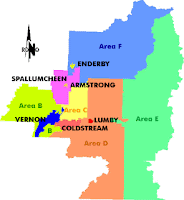Eric Foster, MLA for Vernon Monashee could've mentioned it to the media.
Maybe he did, maybe he didn't.
Maybe he's mentioned it only to elected officials.
But local taxpayers--deeply worried about who could be objective enough to do a pros/cons study on restructuring/unification--have a right to know that the B.C. government actually has a department for local government restructuring!
"...that is [Victoria's] preferred path of service delivery
- download, download, download."
Anonymous comment
Who knew?
It's a sure bet the public doesn't know.
Apparently the poster to our blog story November 24th, 2013 entitled "Anti-unification Arguments Condone Unification" did, as their 3:55 pm anonymous comment included: "The Province has an entire department dedicated to local government restructuring."
Well, flip my pancakes!
Guess most of us taxpayers are too busy running our lives to be aware of this stuff.
Guess the local newspaper folks are too.
Victoria's 24-page document "Managing Changes to Local Government Structure in British Columbia" is here.
From page 5: "Around the province, each community is unique, although there are often shared characteristics. A key feature of the province's approach to local government restructuring is to ensure that the scope and process for a community to consider restructuring is the appropriate response to deal with the unique characteristics and issues in the community".
But Victoria is very heavily pro-regional districts; so it's no surprise our MLA toes that line.
As the anonymous poster also indicated: "...that is their preferred path of service delivery - download, download, download."
From page 11, the report focuses on Municipal Amalgamation, apparently relatively rare in the province.
Must admit it's refreshing to read "the guts" of the topic, beginning with the following:
"There are strong arguments in favour of amalgamation. Through amalgamation, municipalities may benefit from:
- more effective government;
- better ability to manage growth through integrated planning;
- economies of scale or lower per capita service costs when providing some services to a larger population;
- fairer cost sharing;
- elimination of the "free rider" problem in which citizens bordering municipalities benefit from services they don't pay for;
- better integration of infrastructure services like sewerage or solid waste management; and
- more equitable access to resources; for example, an industrial tax base.
- small communities can achieve economies of scale through joint service provision agreements;
- the regional district system can address many of the issues otherwise solved through amalgamation by creating service areas;
- the regional district system allows for fairer distribution of service costs across an urban area;
- the regional district system allows services, like sewerage and solid waste management, to be organized on a regional or sub-regional basis;
- the regional district system can overcome the "free rider" problem if key services are provided on a regional or sub-regional basis;
- economies of scale vary significantly by service and population level;
- the growth management problems created by having many small communities can be reduced by using tools provided by the Growth Strategies Act;
- local autonomy sometimes outweighs the efficiency values of amalgamation;
- smaller community councils can be more accessible to their citizens and have stronger local identities; and,
- smaller communities are better able to match the interests of local residents, their willingness to pay and the services provided."
Will the regional district have the guts to recommend giving Cherryville to Lumby?
How about Spallumcheen to Armstrong or the City of Vernon?
Enderby to Armstrong or Salmon Arm?
Doubt it, but the larger community could sure use the tax dollars and, if the swallowed-up areas are designated to remain "rural", fears of streetlights and curbs (and the tax dollars that requires) would be virtually eliminated.
Kia sighs: "...oh oh, there's that far-too-heavy focus on regional districts," adding "but I'll sleep better knowing that Ida Chong isn't in that department."
She's not, Kia.
She's now Minister of Aboriginal Relations and Reconciliation.
Doesn't bode well for the aboriginals.
But they're used to that system not working.





No comments:
Post a Comment
Share YOUR thoughts here...